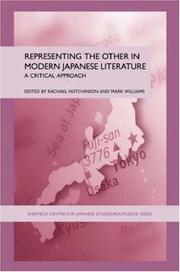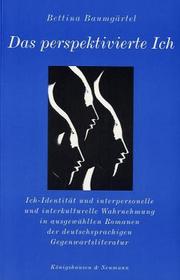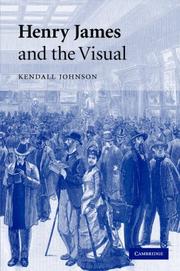| Listing 1 - 10 of 25 | << page >> |
Sort by
|

ISBN: 9780415361859 9780415361866 0415361869 0415361850 9780203012345 0203012348 9781134233861 9781134233908 9781134233915 Year: 2007 Volume: 32 Publisher: London ; New York Routledge
Abstract | Keywords | Export | Availability | Bookmark
 Loading...
Loading...Choose an application
- Reference Manager
- EndNote
- RefWorks (Direct export to RefWorks)
Japanese literature --- Other (Philosophy) --- Self-perception in literature. --- History and criticism. --- Other (Philosophy). --- History and criticism
Book
ISBN: 9789380601045 9780857289438 Year: 2011 Publisher: London Anthem Press
Abstract | Keywords | Export | Availability | Bookmark
 Loading...
Loading...Choose an application
- Reference Manager
- EndNote
- RefWorks (Direct export to RefWorks)
Anglo-Indian literature --- Self-perception in literature. --- History and criticism. --- Bond, Ruskin --- Criticism and interpretation.
Book
ISBN: 3846745782 Year: 2008 Publisher: Paderborn : Wilhelm Fink Verlag,
Abstract | Keywords | Export | Availability | Bookmark
 Loading...
Loading...Choose an application
- Reference Manager
- EndNote
- RefWorks (Direct export to RefWorks)
Die Autobiographieforschung tut sich bis heute schwer damit, in einen produktiven Dialog mit der Medienwissenschaft zu treten. Bislang sah sie in der Schrift (graphe) ein bloßes Instrument, um ein bereits gegebenes Selbst (autos) und seine Lebensge-schichte (bios) darzustellen. Mit dem Konzept der Automedialität wird diese Auffassung in Rich-tung auf eine medial und kultu-rell bestimmte Praxis der Subjek-tivierung überschritten. Der erste Teil des Bandes be-schäftigt sich mit der Rolle der Medialität in schriftgestützten Selbstdarstellungen. Im zweiten Teil wird der Frage nachgegan-gen, welche neuen Selbstprakti-ken sich im Umgang mit visuellen und elektronischen Medien her-ausgebildet haben. Der dritte Teil erkundet die Wechselbeziehun-gen zwischen Subjektkonstitution und Wissensgeschichte.
Book
ISBN: 081393849X 9780813938479 0813938473 9780813938493 0813938473 9780813938486 0813938481 9780813938493 Year: 2016 Publisher: Charlottesville London
Abstract | Keywords | Export | Availability | Bookmark
 Loading...
Loading...Choose an application
- Reference Manager
- EndNote
- RefWorks (Direct export to RefWorks)
Focusing on the literary representation of performance practices in anglophone, francophone, and hispanophone Caribbean literature, Jeannine Murray-Román shows how a shared regional aesthetic emerges from the descriptions of music, dance, and oral storytelling events. Because the historical circumstances that led to the development of performance traditions supersede the geopolitical and linguistic divisions of colonialism, the literary uses of these traditions resonate across the linguistic boundaries of the region. The author thus identifies the aesthetic that emerges from the act of writing about live arts and moving bodies as a practice that is grounded in the historically, geographically, and culturally specific features of the Caribbean itself. Working with twentieth- and twenty-first-century sources ranging from theatrical works and novels to blogs, Murray-Román examines the ways in which writers such as Jacques Stephen Alexis, Zoé Valdés, Rosario Ferré, Patrick Chamoiseau, and Marlon James experiment with textually compensating for the loss of the corporeality of live relationship in performance traditions. Through their exploration of the interaction of literature and performance, she argues, Caribbean writers themselves offer a mode of bridging the disjunction between cultural and philosophical approaches within Caribbean studies.
Literature and society --- Self-perception in literature. --- Performance in literature. --- Caribbean literature --- Literature --- Literature and sociology --- Society and literature --- Sociology and literature --- Sociolinguistics --- History --- History and criticism. --- Social aspects --- Performance in literature --- Self-perception in literature
Book
ISBN: 1438426976 1441620540 9781441620545 143842681X 9781438426815 9781438426976 Year: 2009 Publisher: Albany State University of New York Press
Abstract | Keywords | Export | Availability | Bookmark
 Loading...
Loading...Choose an application
- Reference Manager
- EndNote
- RefWorks (Direct export to RefWorks)
The profound effects of colonialism and its legacies on African cultures have led postcolonial scholars of recent African literature to characterize contemporary African novels as, first and foremost, responses to colonial domination by the West. In Africa Writes Back to Self, Evan Maina Mwangi argues instead that the novels are primarily engaged in conversation with each other, particularly over emergent gender issues such as the representation of homosexuality and the disenfranchisement of women by male-dominated governments. He covers the work of canonical novelists Nadine Gordimer, Chinua Achebe, NguÅgiÅ wa Thiong'o, and J. M. Coetzee, as well as popular writers such as Grace Ogot, David Maillu, Promise Okekwe, and Rebeka Njau. Mwangi examines the novels' self-reflexive fictional strategies and their potential to refigure the dynamics of gender and sexuality in Africa and demote the West as the reference point for cultures of the Global South.

ISBN: 3826019237 Year: 2000 Publisher: Würzburg : Königshausen und Neumann,
Abstract | Keywords | Export | Availability | Bookmark
 Loading...
Loading...Choose an application
- Reference Manager
- EndNote
- RefWorks (Direct export to RefWorks)
Book
ISBN: 9788370725303 Year: 2009 Publisher: Warszawa Wydawnictwo Uniwersytetu Kardynała Stefana Wyszyńskiego
Abstract | Keywords | Export | Availability | Bookmark
 Loading...
Loading...Choose an application
- Reference Manager
- EndNote
- RefWorks (Direct export to RefWorks)
Book
ISBN: 1283377233 9786613377234 0857289438 9380601042 Year: 2011 Publisher: London : Anthem Press,
Abstract | Keywords | Export | Availability | Bookmark
 Loading...
Loading...Choose an application
- Reference Manager
- EndNote
- RefWorks (Direct export to RefWorks)
This study explores the dialogue between the biographical and authorial selves of the writer Ruskin Bond, whose liminal subjectivity is informed by the fantasies of space and time.
Anglo-Indian literature --- Self-perception in literature. --- History and criticism. --- Bond, Ruskin --- Pāṇṭ, Raskin̲ --- بونڈ، رسكن --- Criticism and interpretation.

ISBN: 9780521880664 0521880661 Year: 2007 Publisher: Cambridge : Cambridge university press,
Abstract | Keywords | Export | Availability | Bookmark
 Loading...
Loading...Choose an application
- Reference Manager
- EndNote
- RefWorks (Direct export to RefWorks)
In the decades after the Civil War, how did Americans see the world and their place in it? Kendall Johnson argues that Henry James appealed to his readers' sense of vision to dramatize the ambiguity of American citizenship in scenes of tense encounter with Europeans. By reviving the eighteenth-century debates over beauty, sublimity, and the picturesque, James weaves into his narratives the national politics of emancipation, immigration, and Indian Removal. For James, visual experience is crucial to the American communal identity, a position that challenged prominent anthropologists as they defined concepts of race and culture in ways that continue to shape how we see the world today. To demonstrate the cultural stereotypes that James reworked, the book includes twenty illustrations from periodicals of the nineteenth century. This study reaches startling new conclusions not just about James, but about the way America defined itself through the arts in the nineteenth century.
Book
ISBN: 2811120734 Year: 1997 Publisher: Paris (22-24, Bd Arago 75013) : Éditions Karthala,
Abstract | Keywords | Export | Availability | Bookmark
 Loading...
Loading...Choose an application
- Reference Manager
- EndNote
- RefWorks (Direct export to RefWorks)
Dans la riche littérature antillaise d'expression française, il est un personnage qui revient de manière récurrente depuis une vingtaine d'années, c'est celui de l'écrivain. Lydie Moudileno analyse ses représentations dans la production romanesque de la Martinique et de la Guadeloupe depuis les années 80. En examinant les diverses mises en scène de ce personnage, à la fois marginal et familier, elle s'interroge sur la condition du sujet-écrivant aux Antilles, ses fantasmes, ses limites, ses paradoxes, et sur le rapport qu'il entretient avec ses prédécesseurs, qui vont du contenu traditionnel aux chantres de la négritude. Chacun à sa façon, les écrivains qui figurent dans les romans de Raphaël Confiant, Patrick Chamoiseau, Edouard Glissant, Maryse Condé et Daniel Maximni, repensent leur rapport à la langue, à l'Histoire et à la communauté culturelle à laquelle ils appartiennent, faisant du texte de fiction un lieu privilégié où s'élaborent de nouvelles théories pour la génération de l' "après-négritude". Lydie Moudileno est professeur à l'Université de Pennsylvanie, à Philadelphie, où elle enseigne la littérature française et francophone.
| Listing 1 - 10 of 25 | << page >> |
Sort by
|

 Search
Search Feedback
Feedback About UniCat
About UniCat  Help
Help News
News